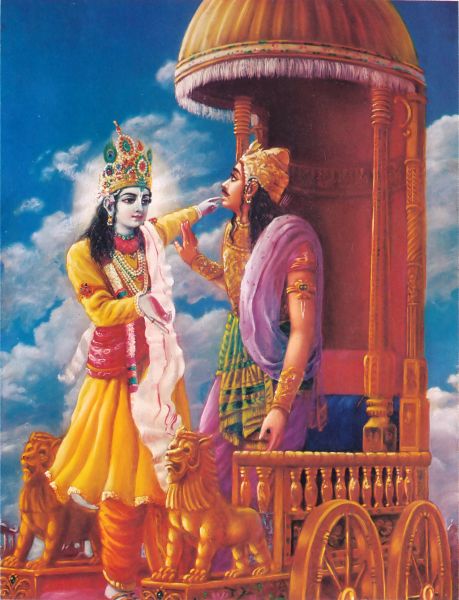|
TEXT 35
sapadi sakhi-vaco nisamya madhye
nija-parayor balayo ratham nivesya
sthitavati para-sainikayur aksna
hrtavati partha-sakhe ratir mamastu
SYNONYMS
sapadion the battlefield; sakhi-vacahcommand of the friend; nisamyaafter hearing; madhyein the midst; nijaHis own; parayohand the opposite party; balayohstrength; rathamchariot; nivesyahaving entered; sthitavatiwhile staying there; para-sainikaof the soldiers on the opposite side; ayuhduration of life; aksnaby looking over; hrtavatiact of diminishing; parthaof Arjuna, son of Prtha (Kunti); sakheunto the friend; ratihintimate relation; mamamy; astulet there be.
 In the Bhagavad-gita, Arjuna ordered the infallible Lord Krsna to place his chariot between the phalanxes of soldiers, for he wanted to observe the enemies he had to face in the Battle of Kuruksettra. TRANSLATION
In obedience to the command of His friend, Lord Sri Krsna entered the arena of the Battlefield of Kuruksetra between the soldiers of Arjuna and Duryodhana, and while there He shortened the life spans of the opposite party by His merciful glance. This was done simply by His looking at the enemy. Let my mind be fixed upon that Krsna.
PURPORT
In the Bhagavad-gita (1.21-25) Arjuna ordered the infallible Lord Sri Krsna to place his chariot between the phalanxes of the soldiers. He asked Him to stay there until he had finished observing the enemies he had to face in the battle. When the Lord was so asked, He at once did so, just like an order carrier. And the Lord pointed out all the important men on the opposite side, saying, "Here is Bhisma, here is Drona," and so on. The Lord, being the supreme living being, is never the order supplier or order carrier of anyone, whoever he may be. But out of His causeless mercy and affection for His pure devotees, sometimes He carries out the order of the devotee like an awaiting servant. By executing the order of a devotee, the Lord becomes pleased, as a father is pleased to carry out the order of his small child. This is possible only out of pure transcendental love between the Lord and His devotees, and Bhismadeva was quite aware of this fact. He therefore addressed the Lord as the friend of Arjuna.
The Lord diminished the duration of life of the opposite party by His merciful glance. It is said that all the fighters who assembled on the Battlefield of Kuruksetra attained salvation by personally seeing the Lord at the time of death. Therefore, His diminishing the duration of life of Arjuna's enemy does not mean that He was partial to the cause of Arjuna. Factually He was merciful to the opposite party because they would not have attained salvation by dying at home in the ordinary course of life. Here was a chance to see the Lord at the time of death and thus attain salvation from material life. Therefore, the Lord is all good, and whatever He does is for everyone's good. Apparently it was for the victory of Arjuna, His intimate friend, but factually it was for the good of Arjuna's enemies. Such are the transcendental activities of the Lord, and whoever understands this also gets salvation after quitting this material body. The Lord does no wrong in any circumstance because He is absolute, all good at all times.
Link to this page: https://prabhupadabooks.com/sb/1/9/35
|
